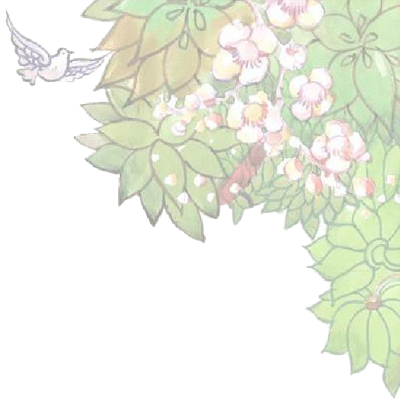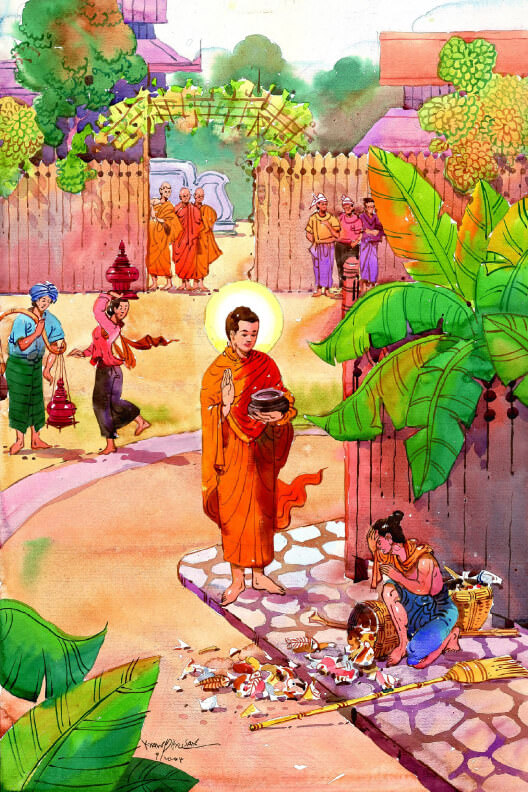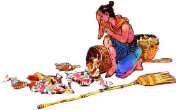36話 くず拾いのスニータ ・・・・ 賤民の阿羅漢

第4部 ブッダをめぐる人々
第1章 さまざまな男たち
36話 くず拾いのスニータ ・・・・ 賤民の阿羅漢

ラージャガハ(王舎城)の街に、しおれた花やごみの掃除屋の一団に属するスニータという名の男が住んでいた。この生存ではかれはみじめな生活を送っていた。なぜなら、かれの過去世で独覚(パッチェーカ)ブッダ(訳注:独りでさとった聖者、辟支(びゃくし)仏)に対して貶めるようなことを口にしたからである。社会的な身分がアウトカースト(訳注:インドの世襲的な身分制度カーストの最下層の不可触賤民)である者の一人として、よい仕事でよい賃金をもらうことは不可能だった。暮らしを支えるために街路の掃除夫として働き、ごくわずかな賃金を得ていた。自分の稼ぎでなんとかやりくりしていたが、それでも着る物や薬、ただの木の小屋といったような生活必需品すら賄えなかった。水っぽい粥をすするだけで毎日、精いっぱいだった。たまに豆のスープと砕け米のご飯のましな食事にありついたが、それはかれが掃除の奉仕をした家の人が、親切にも与えてくれるときだった。身につけているのは下半身をおおう布だけ。夜になると、家がないので、道ばたで眠った。
スニータはまた、ほかの人びととこだわりなく交際したり、行き来したりすることは禁じられていた。上位のカーストの人が街路にやって来るたび、そこからはなれて遠ざからなければならなかった。スニータの影がやって来る人の上にかかったりしないようにするためで、もしもそんなことになると怒られ、こっぴどく罰せられるのだ。かれにとってもっとみじめであったのは、どんなことも学ぶ機会がなく、どんな宗教的な場所にも、宗教的な活動にも、参入することを完全に禁じられていたことである。
ある日、夜の最終更(後夜)に、世尊は坐られながら大悲定(マハーカルナー サマーパッティ)の至福に深く没入されていた。世尊は仏眼(ブッダチャック)で世界を見渡され、なにか役に立つはたらきができないか、ご覧になっていた。そしてスニータの解脱の機が熟していることを見られた。托鉢に行く時間になって、世尊は衣をまとわれ、托鉢の鉢と大衣を持たれ、弟子たちとラージャガハへ向かわれた。
そのころ、スニータは街のごみ、落ち葉、通りに落ちているどんな汚物でも掃除して、くずを拾って籠に集めていた。身体は汗ばみ、ほこりまみれだった。そのとき、遠くの方から、世尊と弟子たちが通りに沿ってやって来るのが見えた。ごみを急いで籠に入れ、捨てるために頭の上に乗せて運んだのだが、世尊と弟子たちがどんどん近づいてきた。かれの心は恐れと驚きでみたされた。待避する場所が見つからず、籠と箒を地面に下ろし、両手を胸の前に組み、壁にもたれて身体を硬直させて立った。
その後、世尊が近寄ってこられ、スニータに思いやりを示されて尋ねられた。
「スニータよ、そなたはこの厳しい暮らしをはなれて、比丘になる気はないか?」
この問いをきいたとき、スニータは興奮で身体がふるえた。心に大きな喜びと幸福があふれ、両眼に涙が光った。このように話しかけてもらったことが以前にはなく、あまりにも深く感動して、ひとことも話せなかった。夢を見ているのではないか、と自分をつねってみた。かれの人生を通じて、他人からは命令か、罵りか、叱りか、それぐらいしか受けとったことがなかったのだ。しかしいまや、かつてかれが決して期待したこともない世尊からのやさしい声と慈しみをもって、尋ねられたのである。
スニータは、こう答えた。
「尊師よ、わたしはいつでも命令されているのですが、このようなご厚意をいただいたことはありません。もし、あなたさまが、わたしみたいな汚くて、もっともみじめなくず拾いを受けいれてくださるのなら、なぜ、わたしがこの厳しくて汚い仕事をはなれないわけがありましょうか? どうぞ、尊い方よ、わたしを比丘にしてください!」
かくて、そこに立ったままであったが、スニータは世尊によって「来たれ、比丘よ!」(善来(エーヒ)比丘(ビック)具足(ウパサンパダー))ということばとともに入団戒を授けられたのである。それから世尊は、スニータ尊者を他の比丘とともに僧院に連れて行った。世尊はかれに冥想の主題(訳注:業処(ごっしょ)=仕事場(カンマッターナ)となる対象)一つを教え、それによってスニータ尊者は辛抱強く実践した。そしてほどなく、かれは阿羅漢に達した。多くの人びとと神々がかれのもとに礼拝し、スニータ尊者は、その達成までの歩みをかれらに説法したのである。
※ 画像やテキストの無断使用はご遠慮ください。/ All rights reserved.

EPISODE 36 Sunīta, THE SCAVENGER
In the City of Rājagaha, there lived a man belonging to a family of flower-scavengers (pupphachaḍḍakakula) named Sunīta. In this existence, he experienced a miserable life because in one of his past rounds of existence he had spoken disparagingly to a Silent Buddha (Pacceka Buddha). With his social status as an outcaste, it was impossible for him to get a good job and a good salary. To support his life, he worked as a road sweeper and earned a very small salary. Although he eked out his income, he still could not afford the basic needs such as clothes, medicine and a simple wooden hut. He could only eat rice gruel everyday. Sometimes, he would eat better meals of broken rice with lentil soup¾the meals were given by a kind family due to his service of cleaning their house. He wore only a piece of cloth to cover the lower part of his body. At night, he slept on the road side, for he did not have a house to sleep in.
Sunīta was also barred from mingling freely or moving about with other people. Whenever a high-caste person went on the road, he had to leave and stay far away from him so that his shadow would not fall on the person, otherwise he would be scolded and severely punished. More miserable to him was that he did not have the opportunity to learn anything and was completely barred from entering any religious place and from joining religious activities.
One day, in the last watch of the night, the Blessed One was sitting plunged into the bliss of Boundless Compassion (Mahākaruṇā Samāpatti). He surveyed the world with His Buddha Eye (Buddhacakkhu) to see whether He could be of service to any. He saw that Sunīta was ripe for deliverance. When it was time to collect alms, the Blessed One dressed. Taking His alms-bowl and outer robe, He went to Rājagaha with His disciples.
At that time, Sunīta was sweeping rubbish, fallen leaves and whatever dirt in the street, and was collecting the scraps in his basket. His body was sweating and was covered with dust. Then, from a distance, he saw the Blessed One and His disciples coming along the street. He hurried to put the rubbish into the basket, carried it away on his head to throw, but the Blessed One and His disciples came nearer and nearer to him. His heart was filled with fear and wonder. Finding no place to stay away, he put his basket and broom down on the ground, and stood stiffly against a wall, with palms joined in front of his chest in respect to the Blessed One.
Thereafter, the Blessed One approached and asked him sympathetically: “Sunīta, would you like to leave this hard livelihood and become a bhikkhu?”
When he heard this question, his body quivered with excitement, his heart was filled with great joy and happiness, and his eyes glistened with tears. He was so deeply touched that he could not say even a word for a moment as no one had ever spoken to him like this before. He pinched himself to make sure he was not dreaming. All his life, he only received orders, curses and scolding from other people. But now, he was asked by the Blessed One with a tender voice and affection that he had never expected before.
Sunīta replied: “Lord, I always receive orders, but never get such kind of favour. If You were pleased to accept a dirty and most miserable scavenger like me, why should I not leave this hard and dirty job? Please, Lord, ordain me as a bhikkhu!”
Thus, while still standing there, Sunīta was ordained by the Blessed One with the word “Come, bhikkhu!” (Ehi Bhikkhu Upasampadā,). Then, the Blessed One took the Venerable Sunīta to the monastery along with the other monks. The Blessed One taught him a subject of meditation by which the Venerable Sunīta practised it perseveringly. And in not too long a time, he attained Arahantship. Many men and devas came to pay homage to him, and the Venerable Sunīta preached to them on his way of attainment.
※ 画像やテキストの無断使用はご遠慮ください。/ All rights reserved.
アシン・クサラダンマ長老
1966年11月21日、インドネシア中部のジャワ州テマングン生まれ。中国系インドネシア人。テマングンは近くに3000メートル級の山々が聳え、山々に囲まれた小さな町。世界遺産のボロブドゥール寺院やディエン高原など観光地にも2,3時間で行ける比較的涼しい土地という。インドネシア・バンドゥンのパラヤンガン大学経済学部(経営学専攻)卒業後、首都ジャカルタのプラセトエイヤ・モレヤ経済ビジネス・スクールで財政学を修め、修士号を取得して卒業後、2年弱、民間企業勤務。1998年インドネシア・テーラワーダ(上座)仏教サンガで沙弥出家し、見習い僧に。詳しく見る
奥田 昭則
1949年徳島県生まれ。日本テーラワーダ仏教協会会員。東京大学仏文科卒。毎日新聞記者として奈良、広島、神戸の各支局、大阪本社の社会部、学芸部、神戸支局編集委員などを経て大阪本社編集局編集委員。1982年の1年間米国の地方紙で研修遊学。2017年ミャンマーに渡り、比丘出家。詳しく見る

※ 画像やテキストの無断使用はご遠慮ください。
All rights reserved.

